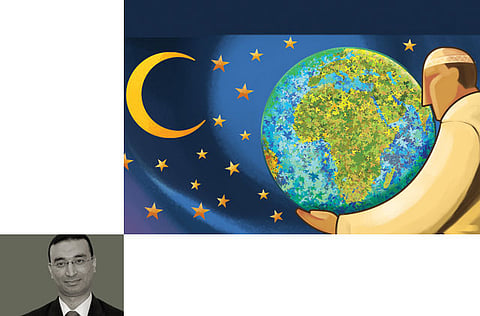Ramadan: Perfect time to go green
Green lifestyle of a Muslim during Ramadan is crucial for acceptance of his fast

Ramadan is not a festival month for Muslims; it is not just a month where one should refrain from food, water and bad attitudes only, but it is a month when a Muslim should pay attention to the real meanings and values of fasting during this holy month. It is an integral part of the religious practices of Ramadan to care about environment and protect the Earth’s precious natural resources.
Muslims must translate the great teachings of Islam, especially during the month of Ramadan, into serious and practical steps to address the challenges that are facing our world — like poverty, hunger and environmental problems.
As much as a Muslim should be keen in the month of Ramadan on religious rites, cooperation, forgiveness etc, a Muslim should also live lightly on Earth (the idea of Al Zohd), not to be extravagant, protect and care for the environment and natural assets. Decreasing calories as well as carbon footprints are excellent opportunities to show responsibility towards conserving the environment in the holy month.
In Islam, man’s relation to the Earth is seen as that of a custodian. “Now, behold! Your Lord said to the angels: I am placing upon the earth a human successor to steward it” (Al Baqarah 2:30). It is required that man should work towards the conservation of Earth’s ecosystems, ensuring sustainability of natural resources for future generations. He must not be extravagant in consumption, whether of food, cloth or natural resources. As cited in the Quran: “Eat and drink of that which Allah has provided and do not act corruptly, making mischief on the Earth” (Al Baqarah 60). In short, to be a Muslim is to pray [worship] and to be a custodian, i.e. to achieve sustainable development on Earth. This is very clear in literature on the fundamentals of Islam.
So, as Muslims, we have a duty as stewards over this planet and it is our responsibility to ensure that the resources and environment are used in a sustainable manner. The month of Ramadan is an opportunity to consider making our fasting experience a little more environment-friendly by adopting a greener lifestyle.
The green lifestyle of a Muslim during Ramadan is very crucial for the correctness and acceptance, Insha Allah, of his fast. Without doubt, adopting an eco-friendly lifestyle in general and especially during Ramadan is not only a social responsibility, but also a religious duty as man’s existence and well-being are dependent on a healthy environment.
Religious authorities and Imams should seize the opportunity of Ramadan gatherings during Taraweeh prayers (following Isha prayers) and Friday speeches (Khutbas) to educate Muslims about adopting a green lifestyle.
A greener lifestyle can be prompted by the application of sustainability to lifestyle choices and decisions during Ramadan. This include, for example, raising awareness about environmental issues among colleagues and younger generations, encouraging the 3Rs (reuse-recycle-reduce), purchase of healthy organic products, avoid the extravagance in consumption, use eco-friendly transportation options (carpool, Metro for instance) and use of eco-friendly appliances. On one hand, all these options will help protect the environment by reducing pollutants, emissions, noise, traffic jams. On the other hand, these will save on our bills (electricity, medical, transportation etc).
Nowadays, in an era of climate change crisis and mounting concerns about energy security — where all countries are struggling to cut down greenhouse gases and are looking for new, clean sources of energy — it is very important to expand the concept of fasting to cover energy consumption. Energy fasting is very similar to food fasting. All that you need to do is to be less dependent on fossil fuel energy sources and consider moving to renewable energy sources.
Also a special attention should be given to water resources as we live in a water-scarce region. This is especially so, given that the teachings of Prophet Mohammad (PBUH) tell us not to waste water during wudu (the cleaning exercise before prayers), even if we are sitting in a running river. All natural resources on Earth, like the human body, need some rest and fasting is a golden opportunity to enable natural resources and the environment to revive, restore, purify and renew.
It is very obvious that a greener lifestyle will help improve the quality of life for the people and at the same time achieve sustainability. Let us seize the opportunity that Ramadan offers and adopt exemplary behaviour to tackle environmental problems and let us hope that this green and responsible environmental lifestyle will continue all year round.


